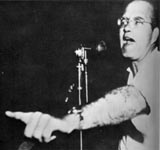|
More People |
|||||||||||||||||||
|
|
|||||||||||||||||||
|
|||||||||||||||||||
|
|
|||||||||||||||||||
|
In 1933, Chibás joined the revolutionary government of Dr. Grau San Martín. Shortly after being appointed to Garu's cabinet, Chibás quit.Chibás did continue to speak in favor of Grau's government. He made extensive use of the radio to build strong support from Cubans, being one of the country's first to use the radio as a political tool. Chibás attacked corruption and gangsters, often at great risk to himself. He gained a reputation as being extremely honest, one of few Cuban politicians at the time to be seen that way. Later, Chibás broke away from Grau's Auténticos, forming his own party called the Ortodoxos, or Cuban People's Party. He usually opposed the Communist Party, and strongly opposed Carlos Prío when he was elected. He spoke against Prío's government's corruption and the gangsters who came with it.Grau and Prío combined to try to prevent what seemed to be a possible victory for Chibás in the election of 1952. On August 5, 1951, Chibás gave his final radio address. He told people not to trust Batista, and spoke against the current regime. Then, after his air time was over, he shot himself. He had wanted people to hear the shot, but poor planning caused the show to end too early. When Chibás died, so to did the Ortodoxos. Fidel Castro had been a member since 1947, began his 26th of July Movement shortly after the Ortodoxos lost Chibás. However, because of the widespread fondness of Chibás, Castro denied being a Communist. |
|||
 Eduardo Chibás was born in 1907. His father, who had the same name, was a well-off engineer who joined the Cuban government.
Eduardo Chibás was born in 1907. His father, who had the same name, was a well-off engineer who joined the Cuban government.